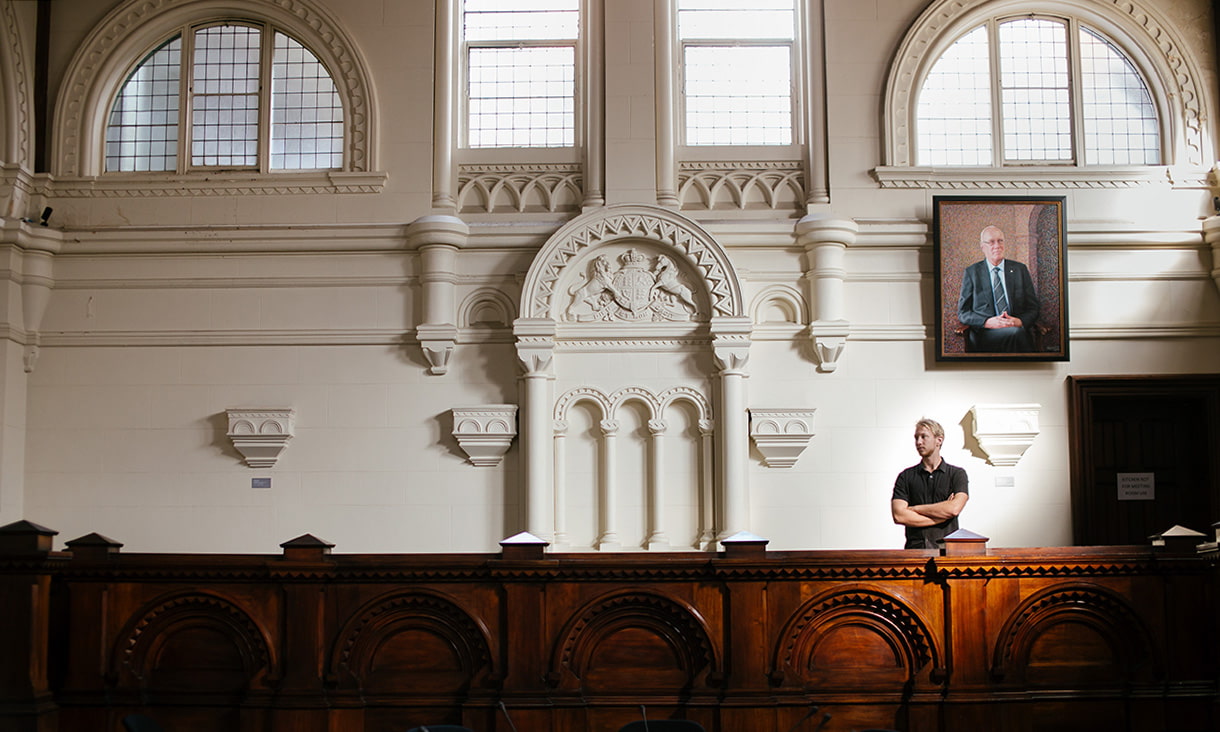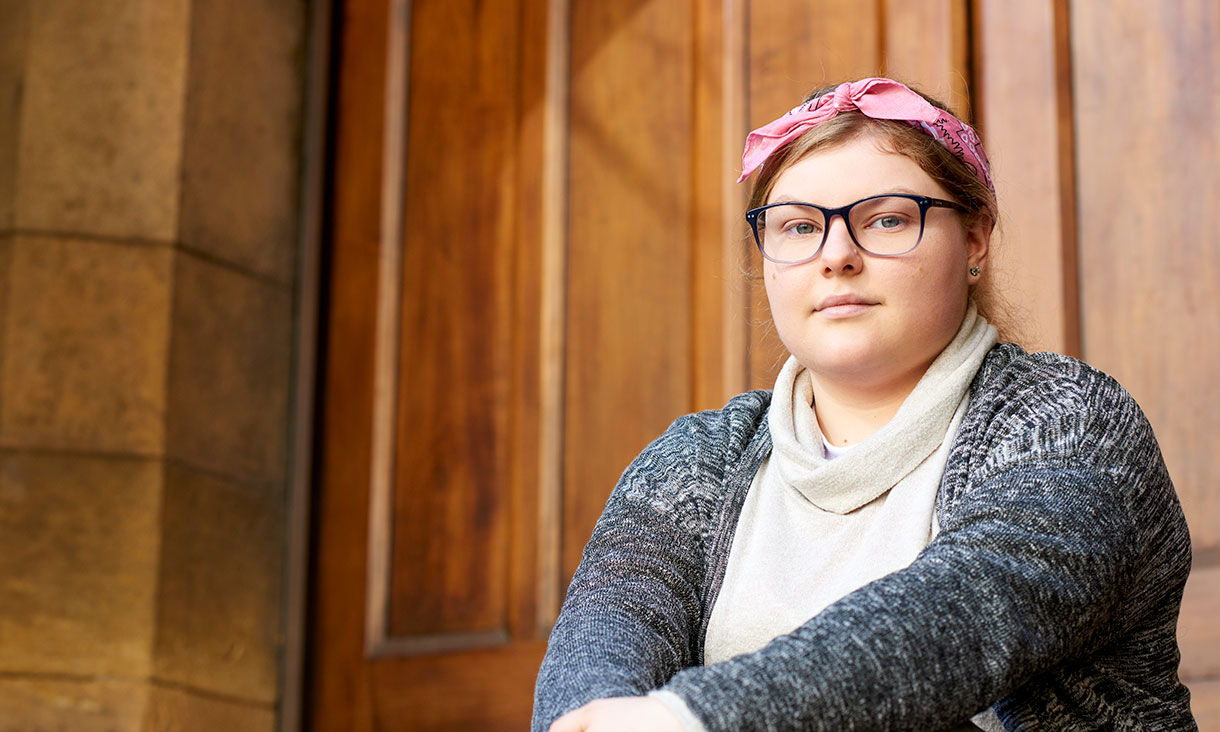Break down the difference between law, legal studies and justice, and explore the career paths they can take you on.
If you’re interested in a career in law, there are lots of options open to you. There are lots of similarities and differences between law, justice and legal studies courses that might seem confusing when you’re choosing what to study. Traditionally law courses prepare you to work as a legal professional, while legal and dispute studies and criminal justice courses are more focused on graduates working in courts, mediation, police and prisons.
We asked students, deans and professors from our law, justice and legal studies courses to break down the different careers these courses prepare you for.

Study law to pursue diverse career options in the commercial legal sector, legal aid, community law, academia, the media, politics or business.
To get the skills you need to be accredited to work as a lawyer in modern legal practice, RMIT offers the Bachelor of Laws and the Bachelor of Laws/Bachelor of Business.
Professor Kathy Douglas, Dean of the Graduate School of Business and Law, is passionate about law reform and legal innovation, and says that the career options of a law graduate are extensive.
“If you enjoy working with others, you're good at communication, business studies, legal studies, problem solving and taking in diverse information, or you have a passion for legal reform: you'll be great for law,” Douglas says.
“It's all about researching a problem and coming up with a legal solution. Being a lawyer is often about being good at persuading people and working as part of a collaborative team.
“In the first year of the Bachelor of Laws you’ll have an introductory subject called Becoming a Lawyer in a Globalised World, focusing on the global issues facing the lawyers of today and the changing world of work for lawyers. You'll work with industry mentors, real professionals in the law, who’ll help you write and present legal research projects. You will also study a mid-degree subject on Law, Business and Human Rights that focuses on international justice.
“Legal technology is embedded in the core law subjects and we have industry-engaged subjects that deal with advising digital start-ups, and justice innovation. All the academic staff and professors are approachable and you’ll learn from well-recognised legal researchers who bring their research into the classroom.
“You also study subjects with embedded legal simulations including criminal law, where you have a bail application in a pretend court to learn how to deal with someone who is applying for bail. You'll learn about civil wrongs, and how to interview clients in a legal setting through a simulation called “practice aspects of law”. In contract law you'll learn about business and how to do contracts for goods and services, like your mobile phone, your rent or the clothes you buy.
“We have an active law student society that arranges mooting competitions, a clinical program that allows for work with community legal services, and international study tours that visit innovative, therapeutic courts.
“After graduating you can go into a whole range of disciplines. A lot of employers recognise the value of a law degree because it teaches you to be a great researcher and problem solver and shows you’ve got the ability to sort facts in a comprehensive and innovative manner.
“RMIT has offered law for admission to practice since 2007 through our Juris Doctor program and we have alumni working in top tier law firms, partners in firms, in government law roles, Legal Aid and private business. Our graduates can go on to work in government departments, like the Attorney General’s, businesses, and large corporations like Telstra.”
Study criminal justice and work in the police force, customs, corrections or the courts.
Criminal justice is an exciting and rewarding profession where you can work with victims of crime, assist in solving crimes, or help prevent crime. If you want to keep people safe and make a difference in your community, criminal justice might be for you.
The Bachelor of Criminal Justice focuses on preparing you for employment, whether it's on the front line of Australia's border protection or working with Australia's Federal Police. You'll explore how criminal justice systems work to serve individuals and the community through law enforcement, policy, practice and reform.
RMIT has strong links with federal and state governments and the wider justice sector. Through the course, you’ll get strong practical experience through a supervised placement in a criminal justice agency or organisation like Victoria Police, customs and border security, corrections, community services or the courts system.
 "It’s rewarding and validating work, to do something for other people and the community, and get to resolve cases and give people outcomes.” — Angelique Maloney-Ray, Bachelor of Criminal Justice
"It’s rewarding and validating work, to do something for other people and the community, and get to resolve cases and give people outcomes.” — Angelique Maloney-Ray, Bachelor of Criminal Justice
Student of the Bachelor of Criminal Justice Angelique Maloney-Ray enjoyed legal studies in school and looked for a university course that would lead to a rewarding job straight after graduating.
“The course offers practical legal experience through internships and study tours, and a lot of support from the lecturers,” Maloney-Ray says.
“Criminal justice aligns with my interests from studying Legal Studies in high school and also the sense of justice I got from my grandma, who was a really big Judge Judy fan. RMIT careers put me through to a community legal centre where I got a volunteer position as a legal intake receptionist. I mostly field questions from clients, answer the phone, book schedules, refer clients onto the correct services and try to make sure that we can offer answers to legal problems for people who are disadvantaged.
“We work with vulnerable groups such as refugees, we do a lot of work with police accountability and we also work with family violence. It’s rewarding and validating work, to do something for other people and the community, and get to resolve cases and give people outcomes.”
Study legal and dispute studies and work in diverse areas of law, justice and dispute resolution.
Dr Peta Malins is Program Manager of the Bachelor of Legal and Dispute Studies and a Lecturer in Criminology and Justice Studies.
“The Bachelor of Legal and Dispute Studies is perfect for students who enjoyed legal studies at high school or who are interested in examining the role of law in society,” Dr Malins says.
“The degree gives you skills in thinking critically about law, advocating for social justice, designing policy and law reforms, conducting legal research, and resolving complex disputes. It’s a unique degree - no other degree in Australia combines critical socio-legal studies with a grounding in practical skills in both law and dispute resolution.
“Our graduates work in diverse areas of law and justice, including in courts and tribunals, law firms and community legal centres, as mediators or arbitrators, in government and non-government agencies and in private business. They can have roles in human rights advocacy, policy development and business negotiation. Some go on to further study via a postgraduate Juris Doctor degree, or an Honours or PhD in justice and legal studies.
“Students graduate equipped with a unique combination of skills that are highly sought after in both justice and business sectors. RMIT has a long-standing commitment to engaging with industry, and the degree is continually informed and shaped by the needs of the sector.
“A core part of the degree is the final year internship where students complete a work placement with a justice or legal agency. This enables students to begin putting their learning into practice in a workplace, develop a range of workplace-related skills and build career supporting networks.
“The course also teaches students about how to research and apply for jobs in their field, build a strong CV and perform well in job interviews, ensuring that graduates emerge fully equipped, skilled and networked, ready to transition to the workplace.”
Story: Hilary Jones